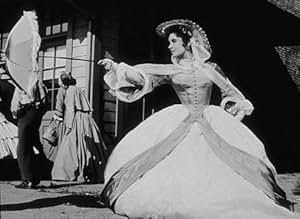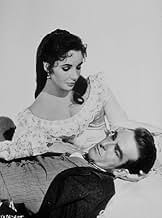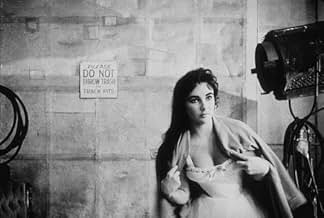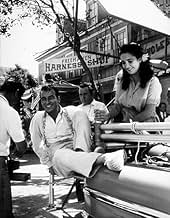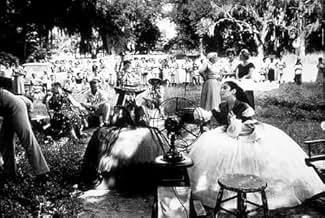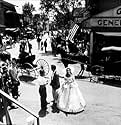अपनी भाषा में प्लॉट जोड़ेंA student falls in love with a Southern belle, but their relationship is complicated by her troubled past and the onset of the Civil War.A student falls in love with a Southern belle, but their relationship is complicated by her troubled past and the onset of the Civil War.A student falls in love with a Southern belle, but their relationship is complicated by her troubled past and the onset of the Civil War.
- निर्देशक
- लेखक
- स्टार
- 4 ऑस्कर के लिए नामांकित
- 1 जीत और कुल 8 नामांकन
- Townsman
- (बिना क्रेडिट के)
- Parthenia
- (बिना क्रेडिट के)
- Townsman
- (बिना क्रेडिट के)
- Jake - Bartender
- (बिना क्रेडिट के)
- Spectator
- (बिना क्रेडिट के)
फ़ीचर्ड समीक्षाएं
I saw "Raintree County" when I was 15. Orphaned at six, I'd just departed from an orphans home in Dallas, after nearly nine years. Knowing virtually nothing of the outside world, I was receptive to everything, every person that I encountered. That summer of 1958, I sneaked into the Forest Park Drive-In to see Elizabeth Taylor, of whom I knew little, other than that she was a breath-taking beauty, and had been recently widowed when Michael Todd's chartered plane had crashed.
The characters in the movie (when I was 15) were literal, if not visceral: the magnificence of Miss Taylor's satin gowns encased over crinoline, Lee Marvin's sharp, smart-alecky wit, the professor's lechery, Montgomery Clift's Yankee stoicism, Agnes Moorehead's curious detachment, were all primary colors.
Forty-five years have passed. Those primary colors are now a multitude of blendings and shadings of secondary colors. Montgomery Clift's character is now a beautifully controlled young man who reflects his parents' stoicism, a young man whose intelligence and self control are at the core of the film, and upon whom all characters revolve.
Originally, I thought that "Raintree County" was strictly Taylor's vehicle. She is the burr under the saddle, the exquisite seductress that interfers with Clift's heretofore regulated, almost predestined lifestyle upon his college graduation.
'Raintree' is an achingly beautiful film, and Miss Taylor, who is the most gifted in her portrayal of anguished characters, blesses the movie. Norma Shearer could be beautiful in 'Marie Antoinette", but she lacked depth. Betty Davis portrayed Sturm und Drang, but was never a clothes horse. Taylor combines the two.
Having read some of the other's comments, most of whom disliked the story, perhaps it helps to be Southern to truly love this film. And also, one wants to realize that it depicts two diametrically opposed cultures: North and South. When Northern chill mixes with Southern humidity, chaos results. And so it did, and it was known as The War Between the States.
In conclusion, one wants to luxuriate in this film: Lockridge wrote a brilliant story, and for the most part, it is well delivered. It is rich in history and characterization.
Elizabeth Taylor is about the only central player who emerges relatively unscathed and her Academy Award nomination was deserved (and certainly more worthy of the Oscar she did win for "BUtterfield 8".)
I bought reserved seat tickets for this before its initial engagement began and the reviewers' generally negative appraisals were available. M-G-M's new big screen process, MGM Camera 65 ("Window of the World" as they termed it, used only once again by the studio for "Ben-Hur"), afforded a handsome showcasing of all the expense lavished upon this production, but, even as a teenager, I squirmed in my seat as its oh-so-lengthy reels unspooled and I left the theater regretting that its makers hadn't somehow achieved something memorable for its quality and dramatic impact, rather than for its longueurs. Johnny Green's score (and Nat King Cole's rendition of the title song) did sound awfully good over the stereophonic sound system at that Beverly Hills, California theater and that's one aspect of this disappointment that is now probably lost forever.
While "Raintree County" was in rehearsals, Montgomery Clift's drinking was out of hand, and threatened to hamper production. Elizabeth Taylor had no real influence on him, despite being his dearest friend and soulmate. Many in the cast and crew expressed their concerns to MGM higher-ups. This led to a series of meetings between Clift and MGM Production Chief Dore Schary. "Raintree" had a $5 million budget, the highest of any American film up to that time, so it was up to Schary to solve problems on the set or behind the scenes before they happened.
Schary left the meetings believing Clift was sincere in his desire to straighten up and behave himself. But he was not convinced that Monty would be able to do it. His demons were too powerful; every picture he made was held hostage to Clift's self-destructiveness. Schary decided to take out a $500,000 insurance policy on "Raintree County" just in case there was a halt in production for whatever reason.
Schary had never done this before, but his "funny premonition" tragically came to pass.
On May 12, 1956, half of "Raintree County" had been filmed. Elizabeth and other of Monty's friends had prevailed upon him to stay sober during shooting, and he was trying to live up to his side of the bargain. At a party at Elizabeth's and husband Michael Wilding's that night, Monty was sober and quiet. He had one glass of wine, and made his excuses and left. He was uncertain about driving down the steep hill to Sunset Blvd., and asked his close friend, Kevin McCarthy ("Invasion of the Body Snatchers") to lead him to the road.
McCarthy described many times in later years seeing Monty's headlights move wildly from one side of the road to the other in his rearview mirror. Then he watched in horror as Monty's car slammed into a telephone pole.
Montgomery Clift's impossibly beautiful profile and the planes of a face the camera adored were destroyed. He was crumpled on the floor of the car, his face and jaws crushed. Elizabeth Taylor resisted all attempts to keep her from going to his side. When she got to him, she straightened him up and pulled his two front teeth out of his throat before he strangled on them.
Recovery was long, slow; unbearably painful. Monty had friends sneak liquor into the hospital. Three weeks after rebuilding his jaws, Monty's doctors realized they had done the job incorrectly. They re-broke his jaws and wired them again.
Production was shut down for weeks. With over $2 million already invested in it, MGM was not about to abandon "Raintree," nor replace its star. Resumption of the project was primarily a question of money for the studio, but to Monty and those who loved him it was a question of pride.
Weeks after the accident, Monty was allowed to see himself in a mirror for the first time. He was not elated with the results, but relieved to see he looked enough like himself that he could continue acting in front of cameras. Greater than his pain had been the fear that his career was over.
Montgomery Clift returned to work on "Raintree County" knowing that the picture was no better than when he left. He returned knowing that audiences would come to see it to play a ghoulish game: they would try to spot him "before" and "after." He returned to the production numbed and dulled by painkillers and alcohol.
Despite his horrific ordeal, despite the liquor and the pills that eased his pain and enabled him to complete the picture, I still believe Montgomery Clift's performance of Johnny Shawnessy to be one of his best.
Clift had an unusual voice and unorthodox phrasing. On screen he was intuitive and sensitive, his portrayals always highly intelligent. However much he rehearsed (and he was notorious for doing things to death) Clift's readings always seemed quite natural. The accident changed none of these things. And equally fine performances were to come, in "Lonelyhearts" (1958), "The Misfits" and "Wild River" (both 1960); and "Judgment at Nuremburg" (1961).
Montgomery Clift died 40 years ago this week, on July 22, 1966. He was 45 years old. But part of him had died ten years earlier on a twisting road in the Hollywood hills. The accident that nearly killed him left him prey to his weaknesses but also to the enormous strength and passion that informs his later performances. "Raintree County" divided Monty Clift's life into "before" and "after."
Oh my, I guess MGM had too big an investment not to release this swollen turkey. As I recall, it got a lot of hyped promotion in '57. For fans, like me, of the Taylor-Clift romantic pairing (A Place In The Sun, {1951}), this misguided sequel should be avoided like the plague. Taylor does her best in a part disjointed badly by a perforated script, while Clift struggles manfully following his traumatic road accident. Also undercutting the romantic theme is the absence of close-ups emphasizing the vital tender emotions. I suspect that was because of Clift's mid-filming disfigurement. Nonetheless, the first 2-hours of personal relationship is further pulled down by impersonal staging. And since so much of the film follows the romance, recovery is near impossible.
The movie does come alive when Lee Marvin's blustery rough-neck comes on-screen. Clearly, he's on his way up the Hollywood ladder. But pity poor Eva Marie Saint of On The Waterfront (1954) whose sterling acting chops are almost totally wasted as the lonely heart in waiting. Where the movie does shine, as others point out, is in the visuals of costuming and massed army men. In short, the sort of production features big-budget MGM typically excelled at. I also like the effort at using the Raintree symbolism to bind the film into a poetic whole. Too bad, the script muddies that with sporadic development.
Anyway, it's regrettable that such a prestige production got undercut by factors not entirely under studio control. I suspect there's a practical moral at work here, but I'm not sure what it is.
Trapping him into marriage with the lie that she's pregnant, and then proceeding to lose her hold on her sanity, Susanna detains the good and helpless John for eight years He is released, able to return to his magnificent dream and to his pure childhood sweetheart, only after tragic events
Retaining the essence of Ross Lockridge, Jr. best-seller, the movie states the equality of the unhappy romance with the Civil War: the personal drama is therefore a reflection of the nation's wounds According to the top-heavy symbolism, Susanna Drake represents the South, corrupting and dragging down the North; she's the Body contaminating the poet's Soul
Taylor plays Susanna Drake's character with an intensity that exceeds all her earlier work Montgomery Clift as the unlucky poet and Eva Marie Saint as his high school sweetheart and true love are on the remote side, but the scenes with Liz strike fire in a wonderfully brilliant way
With its battles and its formal balls, its magnificent riverboats and decayed mansions, its bordellos and madhouses, its childbirth and deathbed scenes, and its evacuation of Atlanta, Edward Dmytryk's "Raintree County," like its source, has undeniable epic dimension
क्या आपको पता है
- ट्रिवियाThe scenes which Montgomery Clift shot for this movie just before his accident represent the only color footage available of him before he was disfigured. All of his previous movies had been shot in black-and-white.
- गूफ़After Abraham Lincoln's 1860 election, the crowd sings "The Battle Hymn of the Republic". However, Julia Ward Howe wrote the poem on which the song was based for the Atlantic Monthly in 1861.
- भाव
Susanna Drake: That 4th of July race... what happens when you win?
John Wickliff Shawnessy: Well, according to a friend of mine, if I win, a beautiful girl will place a garland of oak leaves on my sun-colored locks.
Susanna Drake: I'd like to be that girl.
John Wickliff Shawnessy: Maybe it can be arranged?
Susanna Drake: Oh, it can be arranged, all right. *I'll* arrange it.
- इसके अलावा अन्य वर्जनThe longer Roadshow version was released on VHS by Warner, where it was labeled as Reconstructed Original Version. It has also been shown on Turner Classic Movies cable channel. This version contains nearly 15 minutes of additional material not found on the General Release Version.
- कनेक्शनEdited from गॉन विथ द विंड (1939)
- साउंडट्रैकRaintree County
Music by Johnny Green (uncredited)
Lyrics by Paul Francis Webster
Sung by Nat 'King' Cole
टॉप पसंद
विवरण
बॉक्स ऑफ़िस
- बजट
- $50,00,000(अनुमानित)
- दुनिया भर में सकल
- $6,543
- चलने की अवधि
- 3 घं 2 मि(182 min)


